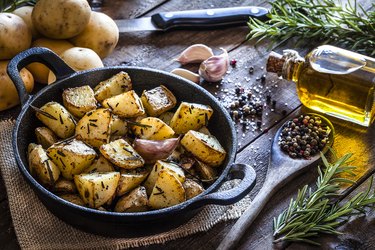With so many cookware options, it's tough to know which ones are safe, effective and long lasting. You want to invest your money in cookware that will last and also makes your life in the kitchen easier. Comparing cast-iron and hard-anodized cookware helps you narrow down the options to find one that fits your cooking style.

Basics of Hard-Anodized Cookware
Hard-anodized cookware starts with aluminum, which is a lighter metal that's not as durable on its own. A special process oxidizes the surface and turns that softer metal into a strong, durable cookware material that's heavier and very resistant to damage. When you compare anodized aluminum vs. stainless steel, the hard-anodized cookware is twice as hard. Many cookware brands make hard-anodized pans, including Circulon, All-Clad and Anolon.
Video of the Day
Video of the Day
Basics of Cast-Iron Cookware
A piece of cast-iron cookware is made by pouring molten metal into a mold to form the specific shape. It's often made as a single piece of metal, including the handle. Cast-iron cookware is often heavier than other materials, which adds to its durability.
Understanding Heat Conduction
Cast-iron cookware takes a little longer than other types to heat up, so you'll need a little patience to get the pan to temperature. It can also heat up unevenly, which can cause issues if you start cooking before it fully heats up. Once it gets hot, cast iron does a good job of holding the heat.
Anodized aluminum cookware gets very hot quickly. It can reach higher temperatures than regular aluminum cookware, which comes in handy for recipes that require high heat.
A Durability Comparison
Cast iron is a very durable cookware material. If you care for it correctly, it may last your lifetime. Without proper care, cast iron can rust.
You also get a lot of use out of anodized aluminum, as the process it undergoes makes it very hard and heavy. The surface doesn't peel, scratch, chip or crack like nonstick cookware. Eventually, the surface does wear away on an anodized pan, so it won't last a lifetime like cast iron, but it does generally last much longer than nonstick pans.
Reactivity With Food
Food reactivity means the material used in the cookware can interact with and affect certain types of foods, especially acidic foods like tomatoes. It can change the flavor of the food and even release some chemicals from the metal into the foods you cook.
Cast iron is reactive cookware, so it may interact with some types of foods. Seasoning the pan on a regular basis can minimize the reactivity to prevent the pans from discoloring your food or changing the flavor.
The hard-anodizing process turns normally reactive aluminum into a nonreactive cookware option. That means you can cook any type of food in the pan without worrying about it reacting to the metal.
Versatility of Use
If you're looking for a versatile pan with different uses, cast iron is a good option. It works on the stovetop and in the oven, which comes in handy if you want to sear food on the stove and finish it in the oven. You can also use cast iron on a grill for even more cooking options.
Hard-anodized pans can also go into the oven as long as the handle is metal because they can withstand higher temperatures. Don't use the cookware in the oven if any part of it would burn, melt or become damaged in the oven.
When choosing anodized or iron cookware, look at the characteristics of each to decide which better fits your lifestyle. You may consider buying both types of pans so you have the right tool for different types of cooking jobs.